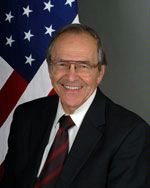A billion dollars a year is a lot of money. You can't move that kind of oil out to the high seas without some pretty significant, high-level cooperation in the Nigerian government and the military.

"Princeton Nathan Lyman" is a diplomat and former Ambassadors of the United States/United States Ambassador to Nigeria (1986–89) and South Africa (1992–95), and former Assistant Secretary of State for International Organization Affairs (1996–98). He is a member of the American Academy of Diplomacy and the Aspen Institute, and is Adjunct Senior Fellow for Africa Policy Studies with the Council on Foreign Relations.
Lyman has a bachelor's degree from the University of California, Berkeley and a Ph.D. from Harvard University.
In January, 2010, Lyman weighed in in opposition to using the U.S. Alien Tort Statute in federal court to gain reparations for South African workers, from corporations who operated in South Africa during the apartheid era.
In January, 2011, Lyman, who has acted for the US government in mediation talks between the north and south of Sudan will be in Sudan for the independence referendum of Southern Sudan.
More Princeton Lyman on Wikipedia.They want to be seen as a major 'player' in the world, and to be a major 'player' you have to carry a certain degree of responsibility.
What it has not been able to do, really, has been to stop the movement of people and weapons down the coast.
The Chinese are offering the loan as an alternative to working with the IMF.
It's nice that we can do these things, but this isn't long-term development. It's good for our image ... but it doesn't substitute for general development because the troops come and go.
The Nigerian government needs to use its naval resources, and get help if it can from the U.S. Navy, to stop the serious bunkering and cut off the big money that is flooding the area with weapons.
Eritrea has made this extremely difficult to deal with. It's not that their position is wrong, but their tactics are terrible. They feel everyone is against them.
You've got the general problem of poverty and lack of government capacity. In Africa, everyone is encouraged to privatize, but there is a very important role of the state, strengthening oversight and regulatory mechanisms as you open up the economy. We've gone far in one way, but not the other.
Copyright © 2024 Electric Goat Media. All Rights Reserved.